
The Republic of Uzbekistan is a presidential constitutional republic, whereby the President of Uzbekistan is head of state. Executive power is exercised by the government and by the Prime Minister of Uzbekistan.

Islam Abduganiyevich Karimov was an Uzbek politician who led Uzbekistan and its predecessor state, the Uzbek Soviet Socialist Republic, from 1989 until his death in 2016. He was the last First Secretary of the Communist Party of Uzbekistan from 1989 to 1991, when the party was reconstituted as the People's Democratic Party of Uzbekistan (O‘zXDP); he led the O‘zXDP until 1996. He was the President of the Uzbek SSR from 24 March 1990 until he declared the independence of Uzbekistan on 1 September 1991.
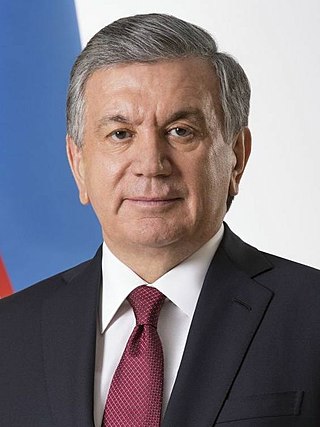
Shavkat Miromonovich Mirziyoyev is an Uzbek politician who has served as President of Uzbekistan and Supreme Commander-in-Chief of the Armed Forces of Uzbekistan since 14 December 2016. Previously, Mirziyoyev led the government as a Prime Minister of Uzbekistan from 2003 to 2016.
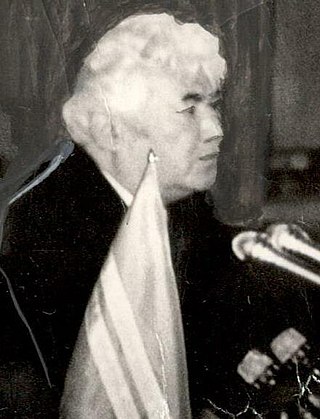
Rahmon Nabiyevich Nabiyev, also spelled Rakhmon Nabiev, was a Tajik politician who served as the First Secretary of the Communist Party of Tajikistan from 1982 to 1985 and twice as the 2nd President of Tajikistan from 23 September 1991 to 6 October 1991 and from 2 December 1991 to 7 September 1992. He was also partly responsible for the Tajik Civil War. Rising out of the regional nomenklatura, Nabiyev ascended to power in 1982 as First Secretary of the Communist Party of Tajikistan. In 1985, he was ousted in a corruption scandal.
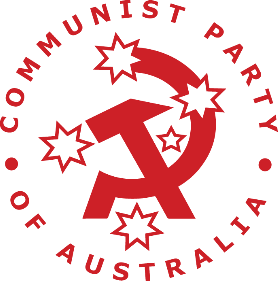
The Communist Party of Australia (CPA) is a communist party in Australia. It was founded in 1971 as the Socialist Party of Australia (SPA) and adopted its current name in 1996. The party was established by former members of the original Communist Party of Australia who resigned or were expelled due to internal disagreements over the Warsaw Pact invasion of Czechoslovakia and the party's adoption of Eurocommunism. The party had its first and only electoral win in 2012 when it gained a seat on the Auburn City Council, which they held until 2016.

The People's Democratic Party of Uzbekistan is a political party in Uzbekistan. It was founded in 1991 as the legal successor of the Communist Party of Uzbekistan. Under its founder Islam Karimov, it oversaw the dissolution of the Uzbek Soviet Socialist Republic and the establishment of the Republic of Uzbekistan. After Karimov resigned from the party in 1996 and later formed the Uzbekistan Liberal Democratic Party, it lost its ruling party status.

Presidential elections were held in Uzbekistan on 9 January 2000. The result was a victory for incumbent Islam Karimov, who received 96% of the vote. Turnout was reported to be 95%.
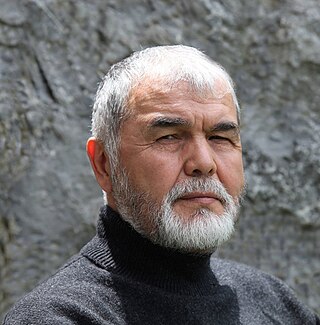
Muhammad Salih is an Uzbek political opposition leader and writer. He was the opposition candidate in the 1991 Uzbek presidential election, the first and only time an Uzbek president has faced a serious challenger in an election.
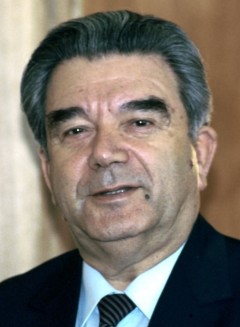
Rafiq Nishonovich Nishonov was the thirteenth First Secretary of the Communist Party of the Uzbek SSR. Nishonov held this position for 17 months, from 12 January 1988 to 23 June 1989. His replacement was Islam Karimov. Prior to that, he also served as the Chairman of the Presidium of the Supreme Soviet of the Uzbek SSR between 1986 and 1988. He was also Chairman of the Soviet of Nationalities from 1989 to 1991.
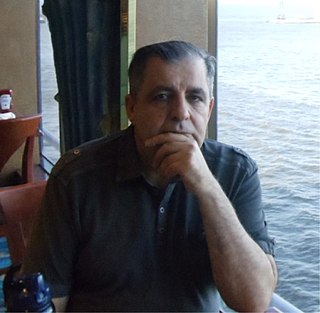
Jahangir Mamatov is a linguist, lexicographer, author, journalist, and a political analyst of Central Asian issues. He is a former member of the Uzbek Parliament and a co-author of Uzbekistan's Declaration of Independence. His writings, tenure in parliament, and other political activities were often greatly at odds with the Uzbek government. He was arrested but escaped into exile for many years. In 2005 he was instrumental in forming the democratic opposition group Congress of Democratic Uzbekistan (CDU) and became its first chairman. His writings are still banned in Uzbekistan.

The Six plus Two Group on Afghanistan describes an informal coalition of the six nations bordering with Afghanistan, plus the United States and Russia, which functioned from 1997 to 2001 under the aegis of the United Nations. The coalition worked to find a peaceful solution that would have included the participation of the Afghan Northern Alliance. Later it explored the issue of a post-Taliban government for Afghanistan.

The Ecological Party of Uzbekistan is a political party and environmental movement in Uzbekistan. It was founded on 2 August 2008 as the Ecological Movement of Uzbekistan, and re-inaugurated as a formal political party in January 2019 in advance of expected electoral reforms.
Direct presidential elections were held for the first time in Uzbekistan on 29 December 1991. Their result was a victory for Islam Karimov of the People's Democratic Party of Uzbekistan, who won with 87% of the vote. Voter turnout was reported to be 94%. The elections were held alongside an independence referendum.

Presidential elections were held in Uzbekistan on 29 March 2015. The result was a victory for incumbent President Islam Karimov, who received over 90% of the vote. Karimov's win gave him a fourth consecutive term as president, dating back to 1990.

Parliamentary elections were held in Uzbekistan on 22 December 2019, with a second round in 25 of the 150 constituencies on 5 January 2020. They were the first elections to be held after the death of Islam Karimov in 2016. The ruling Uzbekistan Liberal Democratic Party remained the largest party in the Legislative Chamber, winning 53 of the 150 seats. All five parties contesting the elections were regarded as loyal to President Shavkat Mirziyoyev.

The first and last presidential elections in the history of the Uzbekistan Soviet Socialist Republic were held on March 24, 1990, one month after the elections to the Supreme Soviet of the Uzbekistan SSR.

Nasrullo Sayidov (Nasrullo Sayyid) is an Uzbek politician and dissident. Former member of Uzbek Parliament (1990-1993). An author, a publicist and one of the leaders of opposition party "Erk", head of the Bukhara Region branch. He is one of the pioneer activists who initiated the acceptance of the Declaration of Independence of Uzbekistan.

Presidential elections were held in Uzbekistan on 24 October 2021. This was the sixth presidential election held since independence. Incumbent President Shavkat Mirziyoyev won a second term with a majority 80.1% of the vote, although faring the lowest performance for an incumbent in terms of vote share since 1991. Maqsuda Vorisova from the People's Democratic Party of Uzbekistan (XDP) was the runner-up and Alisher Qodirov from the Uzbekistan National Revival Democratic Party came third, which marked the first time that more than two candidates had officially received more than 5% of the vote.

Maqsuda Azizovna Vorisova is an Uzbek politician who is serving as a member of the Legislative Chamber of Uzbekistan since 2019. Prior to that, she was a member of the Tashkent Regional Kengash and Senator for Tashkent Region simultaneously from 2015 to 2019. Having a profession as a therapist, Vorisova became active in politics in 2009, where from there, she served as a local councillor within the Zangiata District.

The Uzbek cotton scandal, also known simply as the cotton scandal or the Uzbek scandal, was a widespread corruption scandal in the Uzbek Soviet Socialist Republic beginning during the later years of the rule of Leonid Brezhnev and continuing until 1989.



















